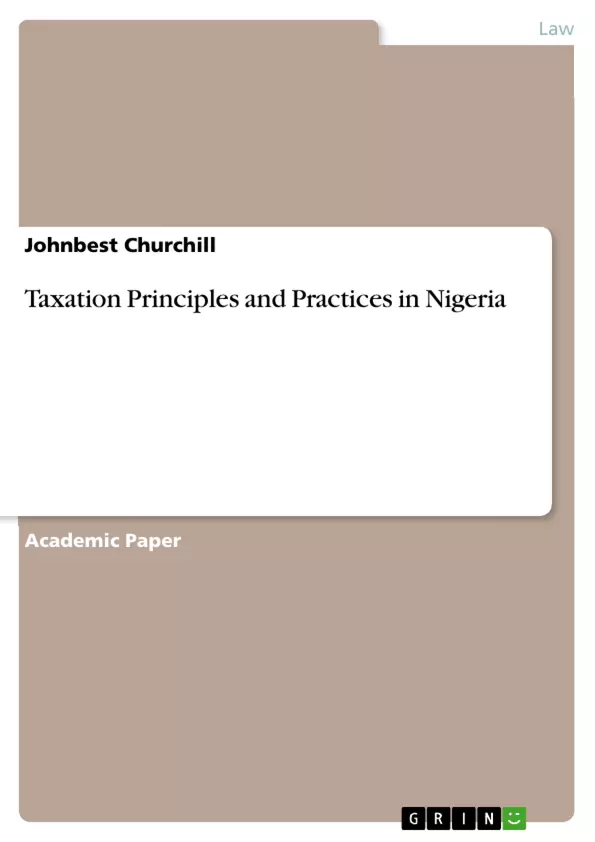Taxation is perhaps the oldest recognized profession in the world. It has always been with us, it is still with us, and it will continue to be with us. According to chapter two, verse one of St. Luke's gospel of the Holy Bible which reported the birth of our Lord Jesus Christ with a decree from Augustus Ceasar that all the world should be taxed. "and it came to pass in those days that there went a decree from Ceasar Augustus that all the world should be taxed;" (and this taxing was first made when Cyrenious was governor of Asyria).
This Biblical record is perhaps the origin of taxation. Taxation may be defined as the compulsory contribution imposed by a public authority, irrespective of the amount of services rendered to the taxpayer in return. Taxation can also be defined according to Ola (1987) as the demand made by the Government of a country for compulsory payment of money by the citizens of the country. Tabansi (1997) says tax is a levy imposed by the Government against the income, profit or wealth of the individual, partnership and corporate organization.
The above definitions emphasizes the fact that taxation is a compulsory levy or contribution that is imposed by the Government on the people resident in the country. Since it is a compulsory payment made either directly or indirectly, refusal to comply becomes an offence, which attracts punishment.
Taxation is divided into various types such as Income Tax, Corporation Tax, Capital Gain Tax etc. In Nigeria, tax is levied by the authority of Federal Government Income Tax Management Act of 1961 (ITMA) and subsequent amendment, including the finance (Miscellaneous Taxation Provisions) Decree 1992 and the finance (Miscellaneous Provisions) Decree 1997. The tax year of most government establishment is based on the fiscal year, which is the normal calendar year and ranges from 1st January to 31st December of the same year. This income tax year is also called the year of assessment, for instance the 1999 year of assessment is the 1999 fiscal year.
Inhaltsverzeichnis (Table of Contents)
- CHAPTER ONE GENERAL PRINCIPLES OF TAXATION
- CHAPTER TWO TAXATION OF INDIVIDUALS.
- CHAPTER THREE COMPANTIES INCOME TAX
- CHAPTER FOUR BASIS OF ASSESSSMENT OF PROFITS OF COMPANIES
- CHAPTER FIVE CAPITAL ALLOWANCES.
- CHAPTER SIX DOUBLE TAXATION RELIEF
- CHAPTER SEVEN CAPITAL GAINST TAX.
- CHAPTER EIGHT THE TAXTION OF TRUST, SETTLEMENT AND ESTATE
- CHAPTER NINE VALUE ADDED TAX (Decree 102 of 1993).
- CHAPTER TEN TAX PLANNING.
- CHAPTER ELEVEN TAXATION OF SPECIAL COMPANIES
- CHAPTER TWELVE PETROLEUM PROFITS TAX (PETROLEUM PROFITS TAX ACT CAP. 354 LFN 1990)
Zielsetzung und Themenschwerpunkte (Objectives and Key Themes)
This text provides a comprehensive overview of the Nigerian tax system, covering both general principles and specific areas of taxation. It aims to explain the history, legal framework, and practical applications of taxation in Nigeria.
- Principles of Taxation
- Taxation of Individuals and Companies
- Capital Gains and Value Added Tax
- Tax Administration and Jurisdiction
- Tax Planning and Special Companies
Zusammenfassung der Kapitel (Chapter Summaries)
- Chapter One: General Principles of Taxation This chapter introduces the concept of taxation, its historical background, and its different types. It examines the legal framework governing taxation in Nigeria, including the key legislation and amendments.
- Chapter Two: Taxation of Individuals This chapter focuses on the taxation of individuals in Nigeria, covering various aspects such as income, deductions, allowances, and the process of tax assessment.
- Chapter Three: Companies Income Tax This chapter explores the taxation of companies in Nigeria, outlining the different types of corporate taxes, the assessment process, and specific provisions regarding company profits.
- Chapter Four: Basis of Assessment of Profits of Companies This chapter delves deeper into the assessment of company profits, examining various methods and principles used to determine taxable income.
- Chapter Five: Capital Allowances This chapter discusses the concept of capital allowances, which are deductions from taxable income allowed for depreciation of fixed assets used in business activities.
- Chapter Six: Double Taxation Relief This chapter explores the provisions for double taxation relief, which aim to prevent taxpayers from being taxed on the same income in multiple jurisdictions.
- Chapter Seven: Capital Gains Tax This chapter deals with the taxation of capital gains, covering the definition, types, and calculation of capital gains tax in Nigeria.
- Chapter Eight: The Taxation of Trust, Settlement and Estate This chapter examines the taxation of trusts, settlements, and estates, outlining the relevant tax laws and regulations applicable to these entities.
- Chapter Nine: Value Added Tax (Decree 102 of 1993) This chapter explores the value added tax (VAT) system in Nigeria, outlining its application, exemptions, and the role of the Federal Inland Revenue Service (FIRS) in its administration.
- Chapter Ten: Tax Planning This chapter focuses on tax planning strategies that individuals and businesses can employ to minimize their tax liabilities while complying with legal requirements.
- Chapter Eleven: Taxation of Special Companies This chapter discusses the taxation of special types of companies, such as petroleum companies and insurance companies, outlining specific regulations and tax considerations.
Schlüsselwörter (Keywords)
Key terms and concepts in this text include taxation, income tax, corporate tax, capital gains tax, value added tax, tax administration, tax jurisdiction, tax planning, and the Federal Inland Revenue Service (FIRS).
- Citation du texte
- Johnbest Churchill (Auteur), 2022, Taxation Principles and Practices in Nigeria, Munich, GRIN Verlag, https://www.grin.com/document/1302325



